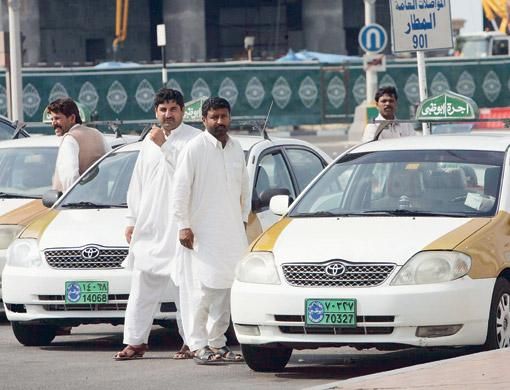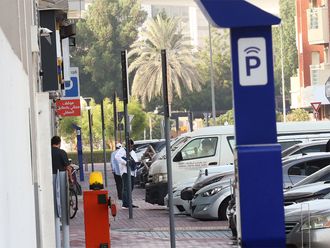Abu Dhabi: A young woman in the crowd got into the taxi, smiled and touched my hand on the steering wheel and said, 'I have been waiting for you for so long. Let us go.'
"She had jumped the queue and there were at least six people in front of her who were waiting a long time for a taxi," said Hussain Ahmad, 52, the Pakistani cab driver.
Ahmad was speaking about some of the unusual incidents in his long career. He is to retire soon with the imminent phasing out of older gold and white coloured taxis.
"I was very surprised," he said. "As I started, she started to apologise. She said she had been waiting for a taxi for an hour. I had to act that we were close, like I am your girlfriend or wife."
It was Ashura (10th of 'Muharram) and all Pakistani Shiite taxi drivers had gone for prayers and there was acute shortage of taxis in the city that time.
Passengers were complaining to Ahmad that they were waiting for at least one hour to get a taxi.
But she was a nice woman who talked a lot during the journey. While giving the taxi fare, she tried to tease him saying: "You still want money even after enjoying the company of a beautiful woman?"
Memoirs
He has several stories to tell about his friendship with nice men and women from different parts of the world.
Ahmad doesn't want to go back to the old stories as he feels there is no point in talking about the old days.
"Although my son who is working as a driver can support me, I want to work at least five more years to avoid being idle... It is difficult after working for about three decades," he said.
"But you can't get a job at this age," Ahmad added.
Gold and white taxis have been ruling the streets of Abu Dhabi for a few decades.
They have served people from all walks of life, but now they have to say goodbye to their customers soon.
They will make way for the new silver taxis introduced in November 2007 and grouped into seven franchises.
While authorities prepare to phase them out, the drivers - divided into the old men and the 'youngsters', most of them being Pakistanis - all have different tales to tell about their retirement from Abu Dhabi streets. Although the old men among them are worried about the sooner-than-expected retirement, but unlike Ahmad, some of them are nostalgic - reliving a walk down memory lane.
"There was a time when the entire city was dependent on us," said Mahmoud Asghar, 50, who came to Abu Dhabi in 1976.
He said the most interesting thing was the response of visitors from Dubai where taxi fares were comparatively expensive then.
"They were surprised to pay Dh2 or Dh3 even after riding for quite a good distance."
Mohammad Yousuf, 45, had many stories about the rewards he received for returning the valuables left behind in the taxi.
"A woman had given me Dh5,000 worth of gold ornaments for returning a bag full of gold jewellery she had left behind," he said.
He is confident that he can get a job, thanks to the contacts he built in the city over the years.
"I am not that old (at 45) and (some of my) contacts have offered me a job," smiles Yousuf.
Worrying
The younger drivers were confident of getting jobs due to the huge demand for drivers. They owed this demand to Abi Dhabi's economic boom, but the present downturn has become their concern these days.
"I was thinking, until recently, about several options after the phasing out of the taxis but the econ-omic downturn has confused me," said Sayed Khan, 25. "Radio news and even entertainment programmes only centres on 'economic problems' since morning."
He now doubts whether the huge demand for drivers in the UAE market still exists.
But he doesn't want to join new taxi companies and prefers to freelance.
"There is no freedom at all. You have to work under too many officials at the company," said Khan.
"You can take a break whenever you want as you are your own manager".
Drivers of old taxis are driving cars owned by local sponsors and pay fixed daily charges - in the range of Dh100 - or a monthly charge as they freelance.












